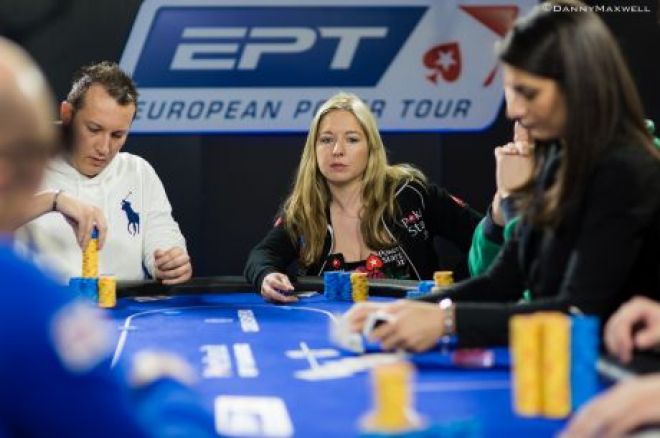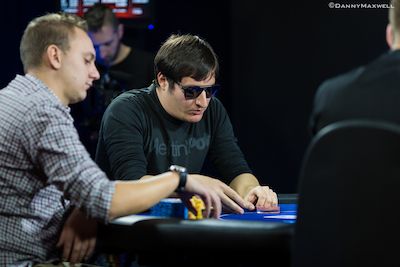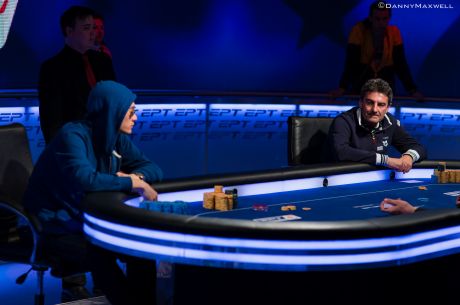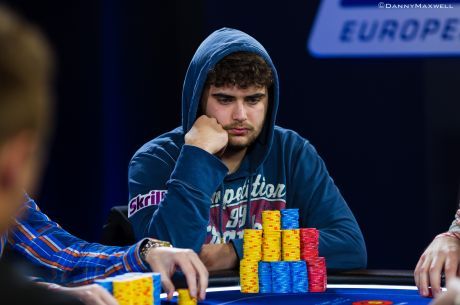Thinking Poker: Checking Flops from Out of Position

It��s often correct to bet the flop after you raise preflop. This isn��t a brute fact, though. It��s because you should often be aggressive when your playing situation is better than your opponent��s �� whether your hand is particularly good or not.
When you have raised before the flop, your playing situation tends to be better than your opponent��s for two reasons:
- you often have position, and
- you often have a better chance at making a very strong hand.
Although a caller��s hand tends to be better on average than a raiser��s, the raiser is often likelier to make hands like overpairs, top sets, and nut flushes, because the caller merely called when he could have three-bet, which makes him less likely to have the biggest pairs and the biggest unpaired hands.
Sometimes the situation is different, however. Sometimes you get called by someone who has position on you. When the stacks are short, moreover, it matters less whether you will occasionally make a great hand. Great hands are great because you will be comfortable taking them to battle in huge pots, but when you��re short-stacked �� such as often happens in tournaments �� there won��t be any huge pots. In these situations it��s more important who has the better chance of making something decent, and that��s often the caller, not the raiser.
For these reasons, it��s often correct to check and not bet the flop when you��re out of position. Even outside the tournament setting, ��Concept No. 17�� from Ed Miller and David Sklansky��s No Limit Hold��em: Theory and Practice simply states: ��If your preflop raise is called behind you, check a lot of flops.�� And �� according to the reasoning in the previous paragraph �� this will often be even more true in tournaments than in cash games.
Last year the European Poker Tour Sanremo Main Event final table finished in dramatic fashion with Victoria Coren Mitchell coming back from eighth out of eight to defeat Giacomo Fundaro heads-up and become the first ever two-time EPT champion. As it happened, those two would play back-to-back hands early on at that final table in which each raised before the flop and then checked flops from out of position. While neither of the hands featured too much action, both illustrated the simple and important idea that sometimes it is better to check than bet in such spots.
Hand #1
With the blinds at 25,000/50,000, Coren Mitchell raised to 100,000 with A?10? and got one caller in Andrija Martic who had 7?7?. Mitchell and Martic both had roughly 1.7 million chips to start the hand, meaning both were below average.
With 310,000 in the pot, the flop came J?6?3?. Despite her overcard and backdoor flush draw, and despite the fact that she had raised preflop, Coren Mitchell checked. Martic then bet 110,000 with his sevens and Coren Mitchell folded.
Although in a cash game I would often bet this flop, even sometimes from out of position, for all the reasons outlined above I think Coren Mitchell made the correct play by checking the flop. Martic would have often held a pocket pair or an unpaired hand he didn��t want to reraise. These hands would rarely have folded the flop, given how rarely Coren would have had a strong hand.
Coren Mitchell was more likely to have a set of jacks, an overpair, or AxJx �� but this fact was much less consequential here than it would have been in a standard cash game. The remaining stacks were only roughly five times the pot on the flop, and under such conditions the difference between one decent pair and an overpair, or an overpair and a set, is much reduced.
Because Martic��s range was effectively stronger than Coren Mitchell��s and because he should have been disinclined to give a free card, she gained another advantage by checking. Additionally, because Martic ought to have bet this flop so often, Coren Mitchell would have been able to check-raise with her best hands.
Hand #2
A similar situation arose in the very next hand, with this one reported by PokerNews in a post appropriately titled ��Fundaro Puts Stefanelli To the Test.��
That one began with Fundaro raising to 105,000 from the cutoff with A?2?. Bruno Stefanelli called on the button with 6?6?, and the blinds folded. Fundaro had roughly 2.7 million to start the hand, while Stefanelli left himself with only 700,000 after he called.
Many observers focused on Stefanelli��s preflop play in this hand. He almost certainly made a mistake by not moving in with his sixes before the flop. He would often have benefited from getting a fold from Fundaro, and his hand was more than strong enough to play well for roughly 16 big blinds before the flop.

Regardless of the quality of Stefanelli��s call, however, it gave rise to the common tournament situation under discussion: a preflop raiser found himself out of position against a range with perhaps fewer premium hands, but certainly more strength on average.
There was 320,000 in the pot when the flop came 8?3?2?. Fundaro checked, which by now should not surprise you. Stefanelli bet 155,000, which is a good play with his strong but vulnerable hand. Fundaro then check-raised to 1 million with his bottom pair and overcard, leaving Stefanelli with an all-in decision getting slightly better than 2-to-1 on his last 545,000.
Stefanelli thought for a long while before finally folding his hand, which was probably a mistake given the circumstances. Unless Stefanelli has a very tight check-raising range, a pair of sixes are simply too strong to fold. The dynamics of the situation, though, were roughly what we would expect from good players when the weaker range is out of position. The out-of-position player checked, the player in position bet (which he presumably would have done with much of his range), and the first player continued aggressively with that part of his range strong enough to merit it.
If this reminds you of a blind defense, it should. The two kinds of situations are not identical, but blind defenses are the most common example of a player with a weaker range of hands playing from out of position. Thinking about that common situation will often suggest good ways to play your hand when you are out of position in a heads-up pot as a preflop raiser, especially in a tournament. Understanding that the caller, not you, is the expected bettor will suggest strategies that are much stronger, fundamentally, than those you would choose if you simply bet whenever you have the initiative.
Be sure to check out Nate and Andrew Brokos on the Thinking Poker podcast, and for more from Nate visit his blog at natemeyvis.com.
Get all the latest PokerNews updates on your social media outlets. Follow us on Twitter and find us on both Facebook and Google+!








